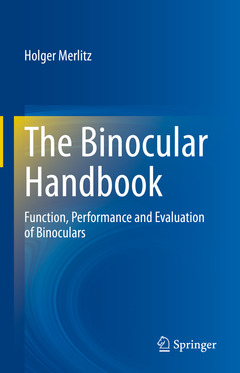Description
The Binocular Handbook, 1st ed. 2023
Function, Performance and Evaluation of Binoculars
Author: Merlitz Holger
Language: English
Subject for The Binocular Handbook:
218 p. · 15.5x23.5 cm · Hardback
Description
/li>Contents
/li>Biography
/li>Comment
/li>
This book is a comprehensive technical treatise on binoculars as visual optical instruments. The author begins by discussing the function of binoculars and the properties of human visual perception. Theoretical models for the synthesis of binoculars and the complex interplay of the different components of binoculars are described. Subsequently, the performance limits, as experienced by the observer in a variety of external conditions, are derived. In the concluding section, the book takes the reader outdoors, where they learn to evaluate the properties and limitations of their binoculars in the field, and to recognize possible problems that may be due to manufacturing errors or accidental damages. Thus, a level of knowledge is provided that will enable the reader to fully exploit the capacities of their binoculars. This book is written for those who work professionally with binoculars and are technically interested, but it is equally useful for professional staff working in the optical industry and the distribution of optical instruments. It includes recent discoveries and is easily accessible to anyone who is seriously interested in learning about binocular function. High school level math is useful to understand the derivations, but not needed to comprehend the results, which are discussed and displayed graphically.
Chapter 1: Optical imaging.- Chapter 2: The Telescope.- Chapter 3: Image Erecting Prisms.- Chapter 4: The Anatomy of Binoculars.- Chapter 5: Report on a Self-made High-performance Binocular (by Gerhard Eller).- Chapter 6: The Eye.- Chapter 7: The Visual Perception.- Chapter 8: Eye and Binocular: The Man-machine.- Chapter 9: Binocular Evaluation and Field Testing.
Dr. Holger Merlitz is a senior scientist in the Institute of Theoretical Physics at the Leibniz Institute of Polymer Research Dresden in Dresden, Germany. His hobbies include amateur astronomy and binoculars. He has 20 years of experience testing binoculars and has published theoretical papers on the effect of distortion in optical instruments and the performance limits of binoculars. Zeiss has endorsed his method to optimize the distortion curves for improved panning performance of their binoculars. Dr. Merlitz has tested instruments for several binocular manufacturers, including China's largest distributor, United Optics, and written articles on binoculars in astronomy for VdS-Journal, a German-language amateur-astronomers magazine.
These books may interest you

Building and Using Binoscopes 47.46 €


